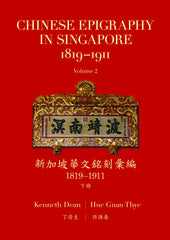News
Follow NUS Press on
Remembering Ann Wee December 12, 2019 18:31

We received the news on December 11th that Ann Wee had passed away that day, aged 93. She was last in the office a few weeks earlier to chat about the sequel she was writing to her 2017 memoir with NUS Press, A Tiger Remembers.
Ann was a cheerful and inspiring presence to all of us at the press. More than being a delightful author to work with, and a frequent attendee of our book launches and events, she was an inspiring model of how to live: seeking to cross cultural borders, moving out of her comfort zone, first observing carefully, then seeking to help, rarely judging, always ready to learn. An Older Person With Attitude, she was the very opposite of preachy:
“When some elderly person claims that, by virtue of his being old he also has wisdom to share, run for cover. He is almost guaranteed to be on the verge of bombarding you with his opinions, which by virtue of his immodest claim, you can be almost certain will be a collection of personal biases and prejudice.
”I have said ‘he’, and it is true that I have met this more often in older men. But what of the occasional older woman with this self delusion? Watch out! She has the Queen Bee Syndrome, and the rest of us in that hive had better stop buzzing around and listen....”
Ann had a presence for sure, but she was was never Queen Bee.
When asked about her memoir, I am apt to say that it is the single best book I know for appreciating Singapore’s transformation over the last 60 years. That might be quite a claim for such a slim and personal volume. Ann certainly knew the statistics and policy narratives of Singapore’s astounding economic development, of its journey from Third World to First. But the stories she tells in her book are stories of people, within their families and social circles, among their colleagues, sometimes in life crisis, sometimes just dealing with the complications of life, work, family or bureaucracy. Hearing these stories is to understand what better education, better health care, better living conditions, expanded opportunity and social change really mean. It yields a far more powerful insight than the one that comes from marveling over Singapore’s changing skyline, impressive as it is.
The single passage of A Tiger Remembers I most admire is Ann’s dedication. Here she does make a judgement, she lets us know what is important to her. You might be tempted to interpret this as a conservative sentiment, even traditional: yet notice how it is tempered with a deep and seemingly so natural understanding of diversity and of difference.
“To the family in all its 101 different shapes and sizes. With its capacity to cope which ranges from truly marvellous to distinctly tatty: still, in one form or another, the best place for most of us to be.”
We will miss Ann!
Two NUS Press Titles Shortlisted for the 2017 Singapore Book Awards April 7, 2017 10:00
We are pleased that two NUS Press titles have been shortlisted for two categories in this year’s Singapore Book Awards.
Best Non-Fiction Title Finalist
A TIGER REMEMBERS: THE WAY WE WERE IN SINGAPORE
 In A Tiger Remembers, Ann Wee, born in the Year of the Fire Tiger, pays homage to the things history books often deem insignificant — questions of hygiene, terms of endearment, the emotional nuance in social relations, stories of ghost wives and changeling babies, rural clan settlements and migrant dormitories, the things that changed when families moved from squatter settlements into public housing.
In A Tiger Remembers, Ann Wee, born in the Year of the Fire Tiger, pays homage to the things history books often deem insignificant — questions of hygiene, terms of endearment, the emotional nuance in social relations, stories of ghost wives and changeling babies, rural clan settlements and migrant dormitories, the things that changed when families moved from squatter settlements into public housing.
Affectionately observed and wittily narrated, with a deep appreciation of how far Singapore has come, this book brings to life the story of social change through a focus on the institution of the family. The late S. R. Nathan is "certain that this memoir will be absorbed in society and will serve as a conversation piece to learn about the various aspects of our past heritage and culture."
Best Illustrated Non-Fiction Title
CHINESE EPIGRAPHY IN SINGAPORE, 1819-1911
The history of Singapore's Chinese community has been carved in stone and wood throughout the country. Professor Kenneth Dean and Dr Hue Guan Thye's Chinese Epigraphy in Singapore, 1819-1911 looks specifically at 62 Chinese temples, native place associations, clan and guild halls, where epigraphs were made between 1819 to 1911 are still found today. Over the course of four years, Professor Dean and Dr Hue visited more than 400 locations to record, photography, analyse and translate these inscriptions into English. These epigraphs are now faithfully reproduced with more than 1,300 illustrations in these two volumes.
The Singapore Book Awards is an industry award for books published in Singapore. Into its third edition, the awards shine the spotlight on the quality of published works and celebrate the achievements of the local publishing industry.
This year’s award winners will be announced at an Awards Ceremony at Pan Pacific Singapore on April 20, 2017. For more information about the Singapore Book Awards and other award categories, click here.
#BuySingLit Highlights (Part 3) February 23, 2017 14:30
In the third installment of our series on #BuySingLit highlights, we look at memoirs written by Singapore authors. Through the memoirs published here at NUS Press, the experiences and personal anecdotes shared by authors have allowed readers to learn more about their outlook on life and the world around them.
Here is a short reading list that gives you glimpses of Singapore and the wider world through different lives that have been lived.
|
From the Blue Windows: Recollections of Life in Queenstown, Singapore, in the 1960s and 1970s
By Tan Kok Yang Have you ever wondered what everyday life was like in one of the earliest housing estates in Singapore during the 1960s and 1970s? In From the Blue Windows, Tan Kok Yang reminisces about life during his formative years in Queenstown. Coupled with a sense of nostalgia, Tan’s memoir pays tribute to the estate he grew up in and takes readers back to a simpler time of Singapore’s bygone past. |
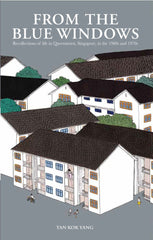
|
|
A Tiger Remembers: The Way We Were in Singapore Born in the Year of the Fire Tiger, Ann Wee arrived in Singapore in 1950 to marry into a Singaporean Chinese family. Affectionately observed and wittily narrated, A Tiger Remembers recounts her experiences of cross-cultural learning such as domestic rituals and emotional nuances in social relations, along with various untold stories of Singapore’s past. With a strong appreciation for Singapore’s social transformation, this book provides a frank perspective on the shapes and forms of the Singapore family through the eyes of a keen social observer. |
 |
|
Tall Tales and MisAdventures of a Young Westernized Oriental Gentleman What transpires when a young Asian student finds himself in the Ireland of the 1950s? This memoir by Singaporean novelist Goh Poh Seng details his adventures as a student in a world with an entirely different milieu and culture. Through his travels in Europe and stay in Dublin, readers are able to catch a glimpse of what shaped Goh to become the writer he is known as today. |
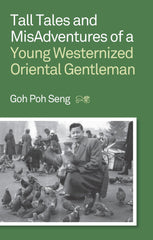 |
#BuySingLit Highlights (Part 2) February 22, 2017 10:00
In part 2 of our series on #BuySingLit highlights, we shift our attention to the discipline of Sociology. In the words of C Wright Mills, “neither the life of an individual nor the history of a society can be understood without understanding both”. Within the local context, Singapore society provides compelling subject matters for sociological inquiry given its metamorphosis since independence.
Here are two NUS Press titles that offer in-depth perspectives of specific social phenomena in Singapore.
|
Remembering the Samsui Women: Migration and Social Memory in Singapore and China
By Kelvin E.Y. Low Leaving their families behind and migrating from the Samsui region of Guangdong, China for a better life abroad, how did the Samsui women come to be icons of Singapore’s burgeoning economic transformation? How were these women, who donned the iconic “red head scarf” (红头巾), remembered for their hard work and sacrifices both in Singapore and China? Situated in the politics of social memory and the processes of remembering and forgetting, Kelvin Low explores first hand accounts of the women’s migratory experiences and how they were ultimately reinvented as industrious pioneers of Singapore through the memory appropriation of the Samsui women. |
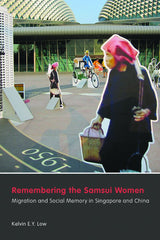 |
|
The AWARE Saga: Civil Society and Public Morality in Singapore After the Association of Women for Action and Research (AWARE) was helmed shortly by a Christian faction in March 2009, the controversy foregrounded issues such as religion, sex education, homosexuality, and state intervention within Singapore’s civil society. In this book, academics and public intellectuals situate the AWARE saga within the country’s political and historical context, further discussing the role of religion in Singapore’s civic society. |
 |
#BuySingLit Highlights (Part 1) February 21, 2017 10:00
NUS Press is proud to take part in the #BuySingLit campaign, the first nationwide initiative led by the local publishing industry to promote the reading and purchasing of Singapore literature. In addition to discounts on selected titles available on our web store, we are also highlighting literary and non-fiction titles in a series of blog posts throughout the week.
Our first installment showcases the Press’s literary publications.
|
The Collected Poems of Arthur Yap By Arthur Yap, with an introduction by Irving Goh Sometimes referred to as a “poet’s poet,” Arthur Yap (1943–2006) published four major collections between 1971 and 1986, all of which are now out-of-print. With color reproductions of original cover art, many of which are Yap’s own paintings, and a critical introduction by Irving Goh, this volume of collected poems represents the burgeoning of recent scholarly activity surrounding his oeuvre. |
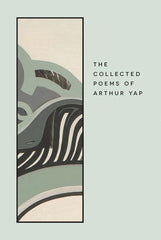 |
|
Noon at Five O’Clock: The Collected Short Stories of Arthur Yap For the first time ever, the rarely-seen short stories of Arthur Yap are brought together in a single volume of collected work. These short stories are less sprawling tales than miniature vignettes—or what Shirley Geok-lin Lim calls “his little area of animation”—all of which proffer glimpses into a mind constantly grappling with the aesthetics of global modernism with the lived experiences of modernity in a newly independent Singapore. |
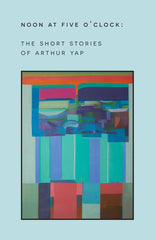 |
|
If We Dream Too Long Widely regarded as the first Singapore novel, If We Dream Too Long explores the dilemmas and challenges faced by its hero, Kwang Meng, as he navigates the difficult transitional period between youthful aspirations and the external demands of society and family. Since its first publication in 1972, Goh's novel has moved and delighted generations of readers and was most recently given a new lease of life and adapted into an interactive theatre-dinner production by Marc Nair and AndSoForth in May 2016. |
 |
|
Writing Singapore: An Historical Anthology of Singapore Literature This volume, which chronologically surveys literary work from the nineteenth to the twenty-first century, broadens the idea of a national literature with its inclusion of stories and poems from the Malay Annals and the Straits Chinese Magazine, as well as classic and forgotten work by Lee Kok Liang and Kassim Ahmad. With its rich offerings of primary material and criticism, Writing Singapore is an excellent resource for anyone with an interest in Singapore literature. |
 |


